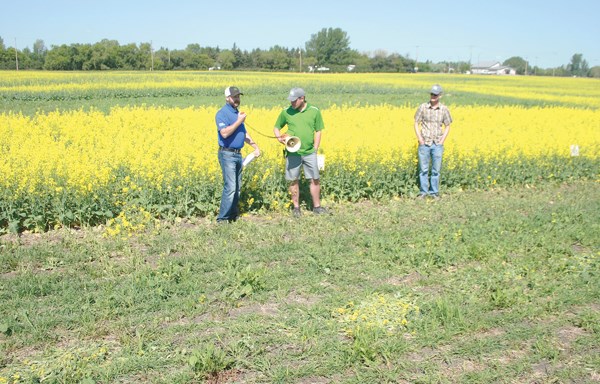For farmers it was an opportunity to take an up close look at research plays part way through the 2017 crop growing season.
For the Parkland College and East Central Research Foundation (ECRF) it was an opportunity to show about 70 farmers, agriculture professionals, and industry representatives what they are doing in reach as they hosted their fifth annual research farm field day recently near Yorkton. The event highlights the agriculture applied research partnership between the College and ECRF, which officially began in 2013.
This summer there are numerous projects underway at the joint research farm one kilometre south of Yorkton on York Lake Road. There is also a secondary site to the west along Queen Street. Researchers are conducting a variety of trials on about a dozen different crops, including canola, oats, barley, wheat, soybeans, lentils, and flax.
Among the presenters was Mike Hall from ECRF and Parkland College providing an overview of the research work.
Lindsay Alberts from Dupont Pioneer talked about plots of a new company variety showing a “60 to 65 per cent” structural resistance to sclerotinia a major concern in canola.
“The fungus Sclerotinia sclerotiorum, which occurs in all the canola growing areas of Canada, causes stem rot of canola. Sclerotinia stem rot, or white mould as it is sometimes called, is one of the most destructive diseases of canola. The severity of sclerotinia stem rot is extremely variable from year to year, region-to-region and even from field to field. Sclerotinia has become more serious as canola production has increased, likely due to a combination of more acres of canola in rotations and management practices that contribute to high yields, but also produce dense canopies, which are a better microclimate for disease development. Wet weather has also favored disease development in recent years,” detailed www.canolacouncil.org
Alberts said while there are fungicides that are effective against the fungus, he added “you’ve got to get it one at the right time.”
Alberts said he would not suggest not to spray, but the new variety will offer a natural resistance option.
Dan Bolton with Northern Quinoa also spoke on plots of that crop.
Quinoa is an herbaceous annual plant grown as a grain crop primarily for its edible seeds.
“After harvest, the seeds are processed to remove the outer coating that contains bitter-tasting saponins. They are gluten-free. Generally, the seeds are cooked the same way as rice and can be used in a wide range of dishes. The leaves are sometimes eaten as a leaf vegetable, much like amaranth, but commercial availability of quinoa greens is limited,” detailed Wikipedia.
“When cooked, the nutrient composition is comparable to common cereals like wheat and rice, supplying a moderate amount of dietary fiber and minerals. The Food and Agriculture Organization of the United Nations declared 2013 to be the ‘International Year of Quinoa’.
Bolton said interest in quinoa is certainly expanding with some 15,000 acres grown on the Canadian Praries in 2016, and doubling to 30,000 this year.
The interest is likely to continue to grow as the United States nears registering quinoa as a cereal crop which will help with accessing that market, he said.
Bolton told producers quinoa should be grown on the best possible fields.
“Where your best canola grows is where your best quinoa will grow,” he said.
In terms of research Bolton said much is ongoing as there is work toward having the crop covered by crop insurance, and gaining registration for some herbicides in the crop.
Because it is not a grass, it is a pseudocereal rather than a true cereal. Quinoa is closely related to the edible plants beetroot, spinach.
Parkland College and ECRF have a long-term plan to carry out agriculture research activities in the Yorkton area. The partnership enabled Parkland College to become the first regional college in Saskatchewan to undertake an applied research program to serve regional economic development. The College also uses the field research site to provide hands-on training to students enrolled in agriculture programs.
The data collected on site throughout the growing season will be shared with the research community, agricultural industry, and local producers. More information on these and other projects is available at www.ecrf.ca.
Parkland College provides high quality, learner centred education and training as a foundation for lifelong success. The College offers a superior learning and campus experience for all students through quality programming and services. Students can get started on their careers by completing university classes, full degrees, and skills training and trades certificates. Parkland College also delivers high school upgrading, safety training, and corporate/professional development. Parkland College is proud to be one of Saskatchewan’s Top Employers for 2017.
Established in 1996, the East Central Research Foundation (ECRF) is a non-profit organization whose mandate is to conduct crop production research and extension activities for the agricultural industry of east central Saskatchewan. It is directed by a board of local producers and advised by provincial specialists.




